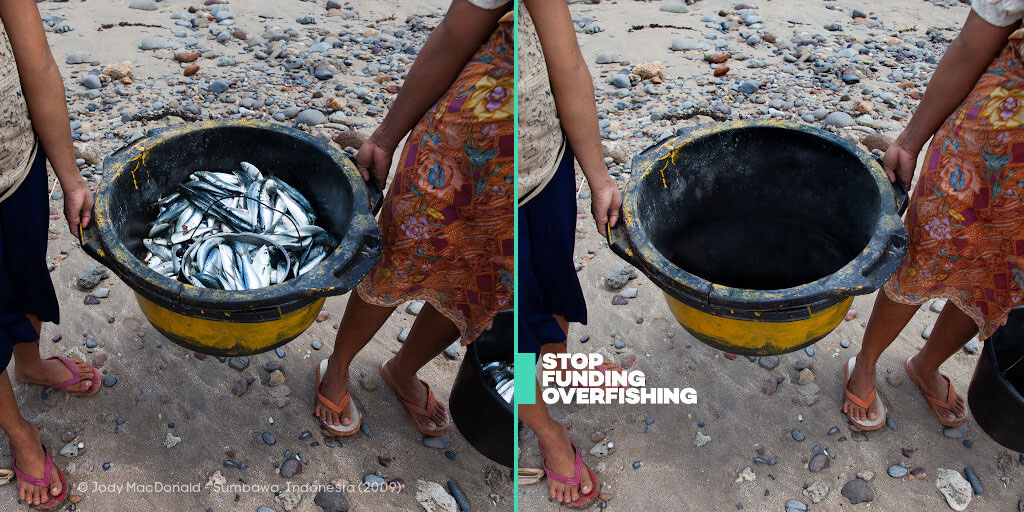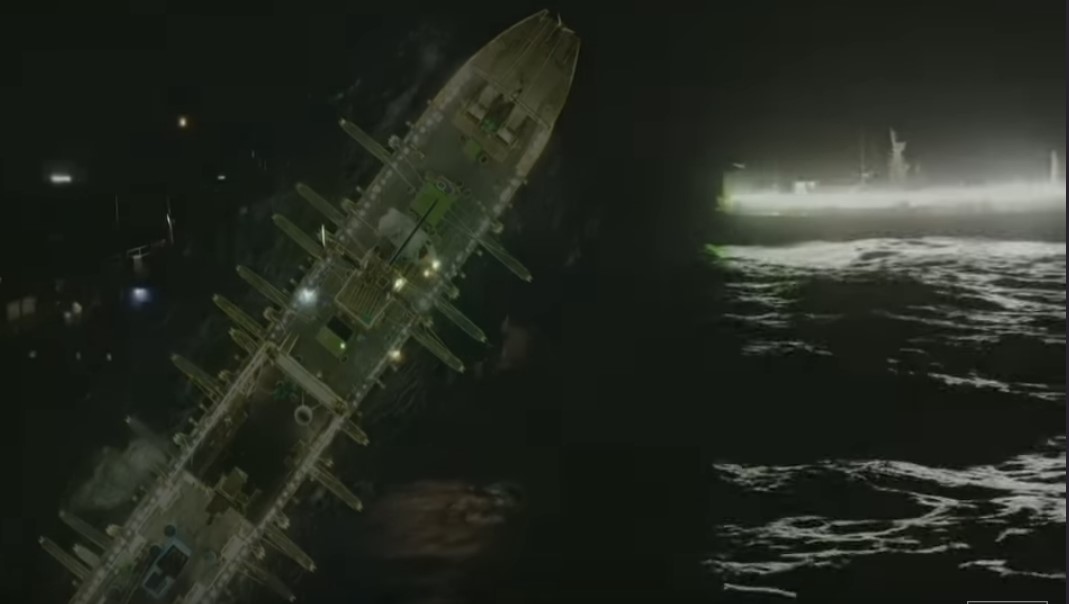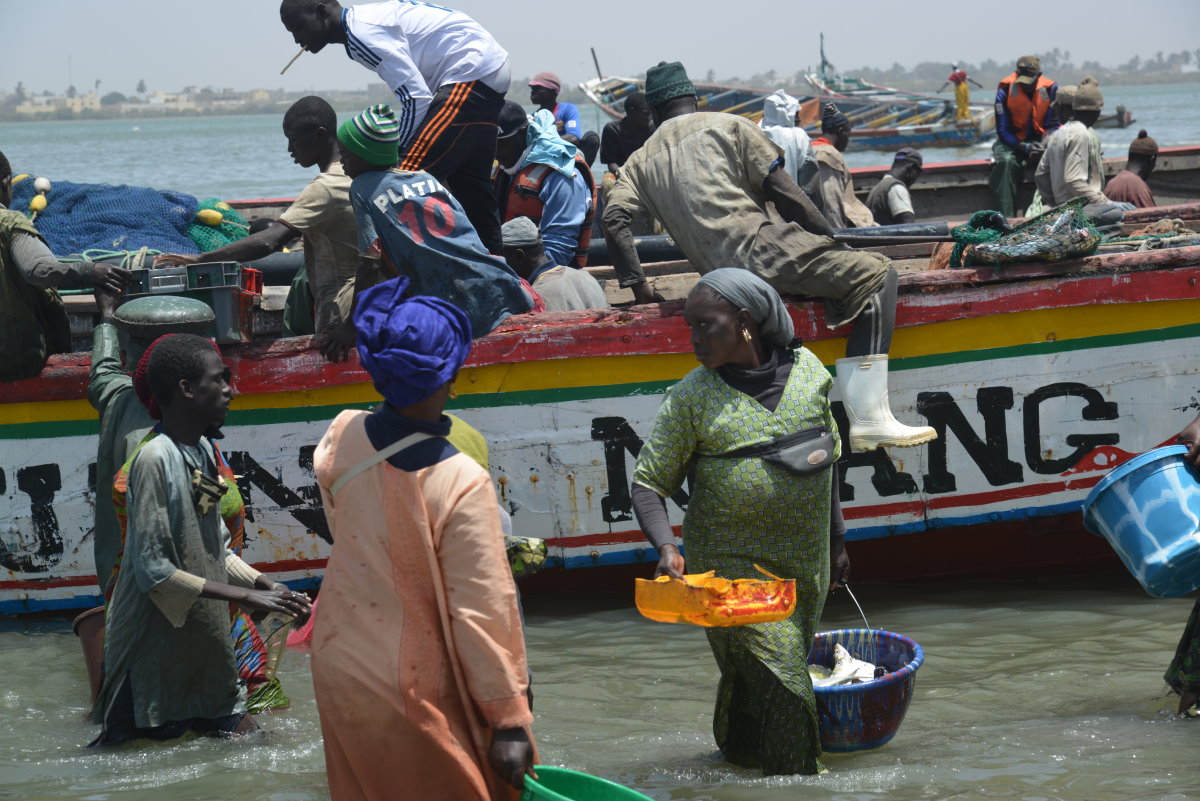Stop harmful fisheries subsidies
Since more than 20 years, the WTO has had a mandate to phase out harmful fisheries subsidies. Even after the adoption of the Sustainable Development Goals by the UN General Assembly in 2015 which restate this mandate in target 14.6 explicitly, movement in this direction has been painfully slow.

An update in 2019 showed an estimate of fully USD 22 billion being spent by governments to support mostly their long-distance industrial fleets! [1] A large coalition of civil society organisations and public personalities has been arguing for many years now that the time for action is NOW. During a recent briefing in preparation of the forthcoming 13th Ministerial Meeting (MC13) in Abu Dhabi (26-29 February 2024) WTO Deputy Director General Angela Ellard reported on progress with the negotiation process. But she also cautioned that unless concrete measures were taken, the global decline of resources would continue unabated.
And here we present some recent research results underscoring Angela Ellard’s concern. But we are also convinced that change is necessary, urgent, doable and actually advantageous for the many.
Change is never easy. Vessel owners come to consider it as their right to get e.g. subsidised fuel for the transoceanic trips, the major cost factor and also a much utilised type of subsidy. The often discretionary nature can be attractive for governments for advancing domestic or international objectives, including trade, competitiveness and more. Lobbies exercise considerable influence in the policy making process, nationally and internationally to maintain the status quo. The cost of the distortions of production and trade conditions are primarily being borne by citizens in subsidising countries, by the marine environment and its resources, mostly in countries of the Global South where the subsidised fleets are operating, by the small-scale fisheries in these countries which see their earning conditions shrink. Citizens and consumers pay actually twice, once for the subsidies, and then again for price hikes reflecting shorter supplies.

The actual details are surely more intricate than outlined above. While there is no suggestion that all subsidised industrial vessels are automatically suspects of wrongdoing, the difficulty of monitoring and controlling practices at sea are a challenge for all national enforcement agencies. A just published ODI report “Fishy business” casts some light on what looks like ‘black sheep’ of the industry. Its key messages following on from in depth research in several countries are:
- “A handful of large conglomerates – 19 companies – owning or operating 657 vessels in the EEZs of Ecuador, Ghana, Peru, the Philippines and Senegal were previously involved in unsustainable practices, including incidental fishing, lack of transparency, participation in the saiko barter system and shark finning. Allowing access to fishing grounds and port infrastructures to vessels with a prior record of wrongdoing raises the danger of backsliding on sustainable fishing commitments. It signifies, too, a missed opportunity for the long-term development and well-being of local fishing communities in these countries.
- Together, these companies’ activities impact 34,000 jobs in the five countries under study, and potentially push 142,000 people below the poverty line. They also have an impact on countries’ GDP: in Senegal, for example, the impact of fishing activities amounted to almost 0.2% loss in the national GDP.
- The largest fishing nations in the countries under study are Ecuador, followed by China, Peru, Spain, Japan, Panama and Taiwan, Province of China.
- A total of 192 vessels were found to be connected to Chinese interests but flagged to other countries. This incorporation of foreign vessels into domestic fleets raises questions, as it can generate market distortions, encourage the excess of sustainable catch limits, and threaten food security and livelihoods.
- The report’s analysis of vessels’ fishing manoeuvres in these EEZs shows intense competition between domestic and foreign fleets of the same fishing type. Foreign distant-water fishing vessels’ technical capacity to fish non-stop and travel to remote areas often awards them a competitive advantage.
- Flags of convenience – or, the system whereby a ship is registered in a different country than the one where its owner resides or holds citizenship – play a significant role in the foreign fleets present in the five EEZs under study. A fifth of the foreign vessels were registered with a flag of convenience and 3% were registered with the blacklisted flags of convenience of Cameroon, Vanuatu and Comoros. This finding raises concerns about safety standards, environmental risks and labour conditions.”

This ties in with findings of a new comprehensive study by Global Fishing Watch aimed at mapping all industrial vessel activities and offshore energy infrastructure across the world’s coastal waters from 2017 to 2021. The study authors found that more than 70% of fishing vessels were not emitting public signals, like the AIS (automatic identification signal to avoid collisions) open to monitoring. Between 21 and 30% of supply and energy vessels were also not publicly tracked. The study covered the 15% of the ocean where 75% of fishing takes place.
We have drawn attention earlier what the combined effect of industrial overfishing and expansion of offshore fossil fuel production means e.g. for women and men in artisanal fishing villages in Senegal, where industrial supplies to fishmeal plants further aggravate the resource overfishing at the direct expense of citizens food security. Quite a few of these industrial vessels are subsidised, whether flying the Senegalese flag with foreign ownership or being flagged to another country. World Fisheries Day, 21 November 2023 saw a big manifestation of a platform of representative organisations putting their demands forward to the government, namely a stop to further industrial fishing licences, an investigation into fishmeal factories and transparency. It is not far fetched to assume that quite a number of the admonished vessels are subsidised.

As we approach MC13, Mundus maris reiterates its strong commitment to the civil society platform ‘Stop funding overfishing’ and demands an end to harmful fisheries subsidies. We highlight the significant gains that can be made for marine ecosystems, small-scale fisheries, and the climate. Like with many of the needed policy and operational changes, we expect some short-term costs, but significant longer-term benefits. Public inclusive dialogue and the fair sharing of costs and the future benefits are major tasks of national and international policy makers so that a strong enough social consensus overcomes the lobbies. In particular we plead for measures that include small-scale fishers and Indigenous Peoples in the process and ensure that decisions affecting their livelihoods be taken with their free prior informed consent.
Our press release in preparation of MC13 can be accessed here.
[1] Sumaila, U.R., et al. (2019). Updated estimates and analysis of global fisheries subsidies. Marine Policy, 109:103695
